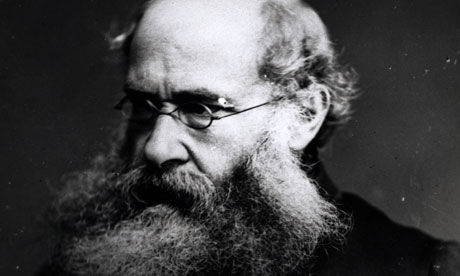What would a Victorian novelist have to say about the “crotch shots” that New York Democratic Congressman Anthony Wiener was caught sending out over twitter. Thanks to a fine New York Times column by self-professed nerd David Brooks, we have a pretty good sense how Anthony Trollope would respond.
I often disagree with Brooks but I admire him as a conservative in the best sense of the word, a Burkean who provides a necessary check to overly optimistic liberal progressivism. (I wish he would also serve as a check to those today who call themselves conservative but who are really Ayn Rand radicals.) It is consistent that Brooks would apply to American politics an author that represents high Victorianism.
Brooks uses Trollope’s novel Phineas Finn to examine a very pressing issue, the tension between following your own vision vs. working within institutional constraints. Finn, a political outsider, vows to disregard what political insiders want from him. Brooks writes that this is not necessarily a good thing:
Trollope’s view was different than ours. Many Americans today assume that people are born with a good Inner Self but get corrupted by politics. American voters are always looking for the Innocent Outsider who can come in and bring sweeping change.
Trollope admired Prudent Insiders, not Innocent Outsiders. His most admirable characters have been educated by long experience. They have grown mature by exercising responsibility. They have been ennobled by custom and civilization. In his books, powerless outsiders often behave self-indulgently and irresponsibly. Those who are in government have to grapple with the world as it really is.
Brooks uses Trollope’s account of an ideal politician to define his own:
Trollope’s ideal politicians — who have names like Plantagenet Palliser, Joshua Monk and the Duke of St. Bungay — put service before independence. Their party and their country have asked them to accept certain duties and face certain problems, and they just get on with it. They are more weighty, but also more boring.
Trollope’s ideal politicians share certain traits. They are reserved, prudent and scrupulous. They immerse themselves in dull practical questions like, say, converting the currency system.
They are not sweeping thinkers, but they make sensitive discriminations about the people and the circumstances around them. They learn to operate within the constraints imposed by their idiom, and they don’t whine or complain about those constraints. They develop delicate understandings of what is required in a given place in time.
Brooks acknowledges that, in our television age, it’s hard to imagine such a man or woman capturing the public imagination. In fact, those Republican candidates who might come close are either doing poorly (former Utah Governor Jon Huntsman) or have withdrawn from the race (Indiana Governor Mitch Daniels—although Daniels was hardly being conservative when he defunded Planned Parenthood Centers). Tim Pawlenty, who may have instincts in this direction, feels that he must resemble a fire-breathing outsider to have a chance. Mitt Romney is putting as much distance as he can between his current manifestation and his time as a prudent insider.
The others—Michele Bachmann, Sarah Palin, Newt Gingrich, Rick Santorum, Rick Perry, Herman Cain–appear prepared to ride roughshod over any number of social institutions. To them, developing delicate understandings and making sensitive discriminations are vices, not virtues.
One candidate who comes very close to Trollope’s ideal is the wonkish No-Drama Obama. In an ironic twist, the candidate of hope and change appears more conservative than many of those who decry him as a radical socialist.
Try applying the following description of a Trollope politician to your own governor, congressman or senator. Imagine what our society might be like if people like this were running it:
They are thin-skinned about any moral transgression they might commit and rigorously honest when judging themselves. They try to make things better but are acutely aware that everything they do might make things worse. As Shirley Robin Letwin wrote in her book “The Gentleman in Trollope,” the Duke of St. Bungay had “modest expectations of his fellow men,” but he was never cynical. Trollope’s leaders don’t embrace change quickly but have to be dragged into embracing it after much interrogation, and the change they prefer is incremental.
Brook concludes:
Trollope’s readers would have come away from his books with a certain model for how practical people should behave, which they could either copy or argue with. I’m not sure his exemplars could thrive amid the TV politics of today, which calls for grand promises and bold colors. But there are prudent, reserved people in government even now. And if more people spent their evenings at least thinking about what exemplary behavior means, they might be less likely to find themselves sending out emotionally stunted tweets late at night.
So what this country needs is more people reading Anthony Trollope? Amen to that, say I.
Go here to subscribe to the weekly newsletter summarizing the week’s posts. Your e-mail address will be kept confidential.


